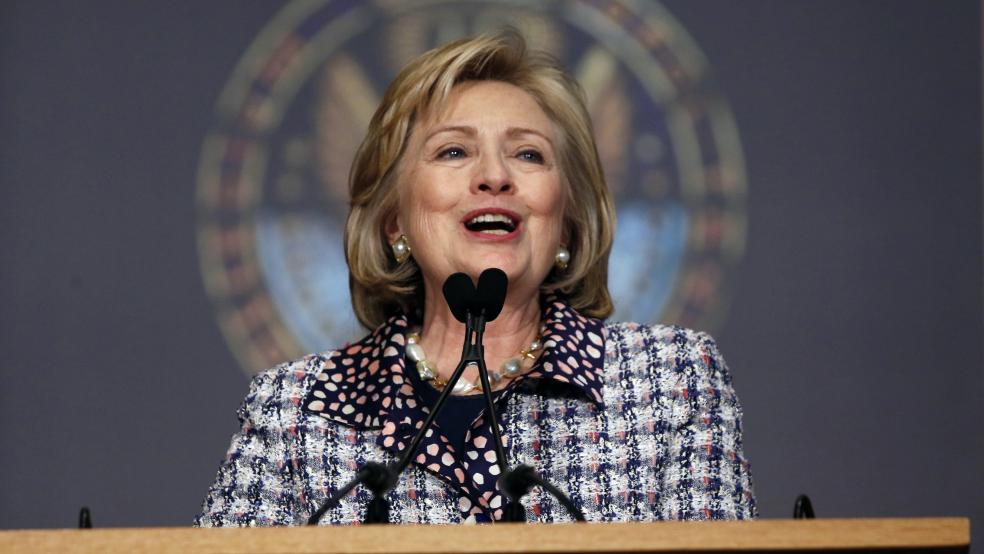Millionaires are sharply divided on their choice for the next President of the U.S., according to the second CNBC Millionaire Survey released today. Yet if a vote were held today, former Secretary of State Hillary Clinton would be the overall favorite among millionaire voters.
The survey polled 500 people with investable assets of $1 million or more, which represents the top 8 percent of American households. According to the survey—a poll evenly split between Democrats, Republicans and Independents—Hillary Clinton is the top choice for 31 percent of millionaires, including 23 percent of Independent millionaires and 5 percent of Republican millionaires.
Related: Election 2016: How 11 GOP Hopefuls Would Defend America
Respondents got to choose among nine potential candidates in the survey: Clinton; Senator Elizabeth Warren (D-Mass.); Vice President Joe Biden; Governor Chris Christie (R-N.J.); Senator Ted Cruz (R-Texas); Senator Bernie Sanders (I-Vt.); former Governor Jeb Bush (R-Fla.); Senator Rand Paul (R-Ky.) and Governor Scott Walker (R-Wis.)
Clinton gets the support of 38 percent of women millionaires and 27 percent of male millionaires. Among male millionaires of both parties, Hillary is the top choice, with 27 percent.
Jeb Bush comes in second among millionaires, with 18 percent. But among Republican millionaires, the former Republican Florida governor is far and away the top choice, with 36 percent support. The runner-up among GOP millionaires is Governor Christie, with 19 percent, followed by Governor Walker, with 18 percent.
Christie attracted more Independent millionaires than any other Republican candidate, with 19 percent (second only to Clinton among Independent millionaire voters). The wealthier millionaires, however, are split between Clinton and Jeb Bush, each getting 27 percent of the vote.
Related: Jeb Bush to GOP: Relax on Immigration, Obamacare
While millionaires have outsized impacts on elections—with their money, influence and votes—they have not always proved to be good predictors of presidential candidates. Before the 2008 election, polls showed that a majority of millionaires planned to support Senator John McCain (R-Ariz.), while Barak Obama had the support of the super-wealthy, those with $30 million or more.
In the 2008 election itself, Obama won more than half the votes of people who earned $200,000 or more, while 46 percent supported Senator McCain. Those measurements were by income, however, and not by wealth like the CNBC millionaire survey.
Before the 2012 election, most millionaires supported Mitt Romney, the Republican candidate for president and former governor of Massachusetts. Still, wealth experts say the support of millionaires in the next election cycle could be important from a fundraising and donor perspective.
"Sometimes millionaires make the wrong call relative to the actual results," said George Walper, president and CEO of the Spectrem Group. "But you do see that the money tends to follow the political world from the millionaire investor."
Related: Looks Like a 2016 Bush-Clinton Race After All
Fully 93 percent of millionaires polled said they voted in the fall mid-term elections. That statistic was consistent across male and female voters and by ages and political affiliations.
More than a quarter of millionaires donated to candidates in the 2014 election cycle, though only 4 percent said they gave more than $1,000. Democrats gave more to candidates than Republicans—with 10 percent giving more than $1,000 compared to 3 percent of Republicans.
When asked about the most important issues for the 2016 elections, taxes and government spending was the No. 1 concern for millionaires (29 percent), followed by political gridlock (22 percent) and the economy and unemployment (20 percent). Those results, however, like much the poll, depended on the political party of the respondents. Among Republicans and multimillionaires, government spending was the overwhelming top issue (42 percent), while among Democrats the top issue was political gridlock.
Millionaires said the top priority for the next Congress should be corporate tax reform. The second most important priority, they said, should be immigration reform, followed by repealing the Affordable Care Act and increasing the minimum wage.
Related: Romney Tops List of 2016 GOP Presidential Hopefuls
Those answers, however, differed depending on the millionaire's political party. Among Republicans, the overwhelming top priority is repealing the Affordable Care Act (35 percent), while only 2 percent of Democrats support a repeal of Obamacare as the top priority. For Democratic millionaires, the top two priorities are the minimum wage and immigration reform.
Millionaires are most united on corporate tax reform, with 23 percent of Republicans and 25 percent of Democrats saying it should be the most important priority. Among multimillionaires (those individuals with investable assets of $5 million or more), corporate tax reform is far and away the top priority.
"The biggest message is that millionaires want something done in Washington," Walper said. "They're saying that the dysfunction in Washington has to stop."
This article originally appeared in CNBC.
Read more at CNBC:
Do you think like a millionaire? Take this quiz
Behind Warren Buffett's donation to Hillary PAC
For 2016, Hilary had the worst night




